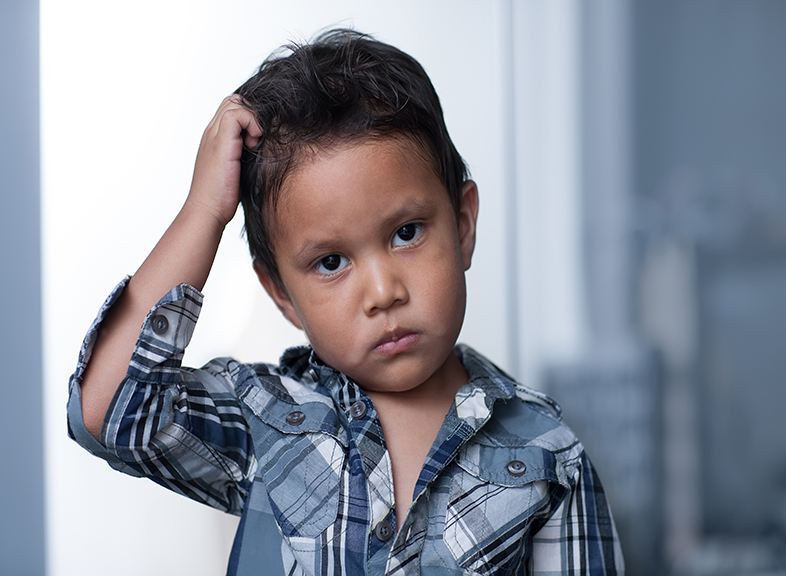- Behavior
- Health
- Parenting
Why does my child keep pulling their own hair?

1. What is trichotillomania?
2. What are the causes?
3. How to get help?
Like adults, children react to stress, anxiety or depression in conscious and unconscious ways. Biting their fingernails, sucking their finger and wetting the bed are common coping mechanisms, but less known is pulling at their hair, eyelashes or eyebrows.
1. WHAT IS TRICHOTILLOMANIA?
An estimated 3 percent of the population suffers the compulsion to pull at body hair while combatting anxiety, called trichotillomania or trich, according to the Anxiety and Depression Association of America.
The uncontrollable urge can be severe enough to leave bald patches even though it momentarily gives a sense of satisfaction or relief. Root causes are attributed to boredom, stress or “zoning out.”
2. WHAT ARE THE CAUSES?
Trich could be a sign that a child may be dealing with unresolved anxiety or an inability to cope with stress in a productive way. But sometimes the reason is unknown, the association says.
“Trichotillomania is categorized as an obsessive-compulsive disorder but is unique in that the hair-pulling is not triggered by an intrusive or unwanted thought,” says Joan Kieffer, director of School-Based Mental Health Program for the Center for Child Counseling in Palm Beach County. “Some folks are very conscious of their hair-pulling and others are not. Anxiety and boredom may be contributing factors, so that is something parents may want to tune in to.”
Stephanie De La Cruz, clinical director at the center, says her experiences with trich have been fairly rare. However, she recalls a 3-year-old client who pulled at her eyebrows, eyelashes and scalp because of an anxious attachment to her mother. De La Cruz counseled the child and mother to ease the behavior.
3. HOW TO GET HELP?
Therapy recommendations by the Mayo Clinic have helped people reduce or stop the behavior. Options include habit reversal training, which teaches how to recognize trigger situations and choose an alternative, such as clenching your fists or moving your hands from your scalp to ears. Cognitive therapy may help dispel the idea that hair-pulling is helpful, while acceptance and commitment therapy helps accept hair-pulling urges without acting on them.
Trich support groups that share strategies and success stories can help lessen feelings of isolation and embarrassment. For example, Trichy Picky Parenting is a closed Facebook group for more than 3,400 parents of children suffering from trichotillomania, skin picking or other body-focused repetitive behaviors. The largest Facebook support group, Heads Up Hands Down, has more than 14,000 members.
Locally, the Center for Child Counseling offers therapies for children dealing with skin-picking, hair-pulling and other obsessive-compulsive behaviors, De La Cruz says. It accepts some health insurance but offers sliding scale fees if you have out-of-network private insurance. If you don’t have insurance, the cost may be covered by grants or Medicaid.
If your child is age 18 or older, Hair Pullers Anonymous offers a 12-step support group.
SOURCES:
• Stephanie De La Cruz, clinical director, Center for Child Counseling
• Joan Kieffer, director of School-Based Mental Health Program, Center for Child Counseling
• Anxiety and Depression Association of America
• Mayo Clinic
You May Also Like
-
- Behavior
- Health
- Parenting
How to help ease your child’s stress in elementary school
Does your kid seem overwhelmed? Start by helping your child identify stressful triggers, such as school situations or homework. Tap here to find out what else you can do. …
Read More -
- Behavior
- Health
- Parenting
Use positive approach for your preschooler’s bad habits
Thankfully, most odd habits are not harmful, and children usually outgrow them. In the meantime, it's best to use positive reinforcement instead of yelling or punishing them. Read …
Read More
Related resources
-
- Behavior
- Health
- Parenting
Boys Town South Florida
Based in West Palm Beach, support, services and information for at-risk children and their families in South Florida
561-612-6000 Website -
- Behavior
- Education
- Parenting
Palm Beach County Behavioral Health Coalition
Local information, events and support for parents and youth to live free of drugs, alcohol and tobacco
561-374-7627 Website Email -
- Behavior
- Health
- Parenting
Center for Child Counseling
Mental health services in Palm Beach Gardens for families, specializing in play therapy for children who've experienced trauma
1-800-480-1899 Website Email -
- Behavior
- Health
- Parenting
Center for Family Services of Palm Beach County
Individual and family counseling
561-616-1222 Website Email -
- Behavior
- Other
- Safety
National Alliance on Mental Illness Palm Beach County
Teen Connection Support Group - The groups allow youth to work together to overcome common issues. Weekly topics/activities may include boundaries, communication styles and skills, wellness toolbox, healthy relationships, values, vision boards, decision-making, and more. Topics may also include issues related to substance use/addiction.
561-588-3477 Website Email
